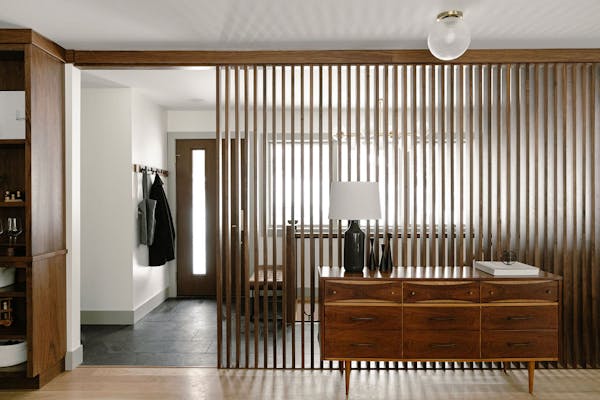Situated on a sunny corner lot across the street from an elementary school and grassy field, Anna Mason's and Kevin Kniebel's1924 two-bedroom house in Minneapolis' Howe neighborhood served the couple well for 10 years.
They were attached, even as the space began to feel pinched. "Both our children were born in this house, so we had a lot of motivation to try and figure out how to stay," Kniebel said.
The couple decided to consult an architect after seeing the positive experience Mason's parents had working with one on their cabin.
"We wanted the expertise, artistry and partnership an architect would provide. We were really just exploring the art of the possible at first," Mason said.
They talked to a few practitioners before choosing Christopher Strom and Eric Johnson of Christopher Strom Architects. Mason and Kniebel liked their modern style and intuitive and collaborative approach.
"Chris and Eric made us feel comfortable about what were essentially hypothetical and very expensive decisions," Kniebel said.
The logical solution was to go up — add a second story and put the bedrooms there to ease congestion on the first floor. Strom was confident they could do it with minimal impact on the main floor to save money and leave the home's original cove moldings in the living and dining rooms intact during construction. The project, called "Pop the Top," is a 2023-2024 Star Tribune AIA Minnesota Home of the Month winner.
Missing tooth
Job one was to find a place for the new staircase that wouldn't mess up the main floor layout. Fortunately, the home's existing design presented the perfect spot — a recessed area on the south side between the kitchen and living room, a "missing tooth" where Strom could plug in a U-shaped staircase.
Even better, it didn't require new foundation walls because the staircase framing could span from side to side between the existing walls. Strom also put a large picture window over the staircase and two smaller square windows near the lower landing, to take advantage of the southern exposure and brighten the entire house.
He had hoped the existing foundation could support a second floor, but a structural engineer told them otherwise.
"The old house had a foundation but no footings, so we couldn't add more weight without having the house settle," Strom said.
The team solved the problem with helical piers — steel shafts with blades drilled into the ground to support the existing foundation and increase its load-bearing capacity.
Increasing scope
The refreshed kitchen wasn't part of the original plans, although it was discussed. Nevertheless, after the builder, Scott Stankey of Resonate Homes, finished framing the staircase and second story, he asked Mason and Kniebel one more time if they'd like to reconsider.
The couple saw how the rest of the house was being transformed and decided to go for it. Johnson was happy to draw up a design quickly.
"Projects like this are big undertakings and it's not uncommon for clients to increase the scope once they see what's required, so they don't have to go through it again," he said.
Kniebel agreed. "It was a 1970s kitchen. We knew the house would feel more cohesive if we did it."
They kept costs down by leaving the plumbing where it was, keeping the existing flooring and even sourcing a few windows at the ReUse Store. And although the changes are primarily aesthetic, save a small, cantilevered bump-out banquette with a window that Johnson devised, the results are transforming.
New cabinets, appliances and fresh turquoise tiles match the energy and modern feel of the rest of the house and the dining nook is a welcoming spot for family meals, homework and hanging out with the cook.
Laundry closet
In addition to three bedrooms, one bath and a laundry room on the new second floor, there's a gathering space where the family hangs out before bed, reads together and Kniebel, a banjo player, sometimes strums.
He and Mason skipped an en suite for themselves in favor of a sizable shared bathroom with a separate wet room for the toilet and shower so family members can use it simultaneously. In another unconventional choice, the couple put their closet in the new laundry room across the hall from their bedroom.
"It seemed like a practical solution," Kniebel said. "Certainly makes putting away clothes easier."
About this project
Designing firm: Christopher Strom Architects.
Project team: Lead/principal architect Christopher Strom, AIA; associate principal architect Eric Johnson, AIA.
Project partners: General contractor, Resonate Homes; interior design, InUnison Design; structural engineer, Bunkers & Associates.
Laurie Junker is a Twin Cities-based writer specializing in home design and architecture.

The 5 best things our food writers ate this week

A Minnesota field guide to snow shovels: Which one's best?

Summer Camp Guide: Find your best ones here

Lowertown St. Paul losing another restaurant as Dark Horse announces closing


